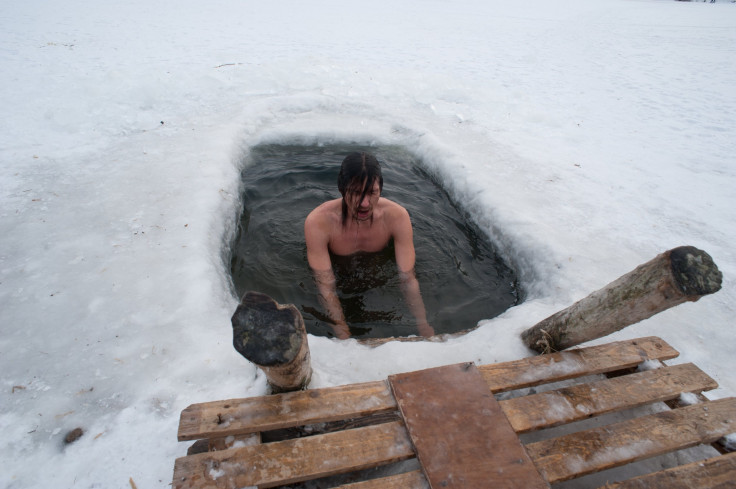Hypothermia: How To Increase Your Chances Of Survival In Freezing Water

Though you may not spend a lot of time boating or fishing, it’s important to be mentally prepared just in case an accident occurs that leaves you thrown into ice cold water.
Though hypothermia can occur in any cold environment, whether you’re hiking on a mountain, thrown into freezing water, or simply stuck outside in the snow without proper clothing, you lose body heat 25 times faster in cold water than in air. You’re officially hypothermic if your body heat drops from 98.6 degrees (37 degrees Celsius) to 95 degrees (35 degrees Celsius) or lower, and become severely hypothermic if your body temperature is below 80 degrees.
So how do you survive in a situation that leaves you stranded in a lake with water that’s 50 degrees? The fact is, unless you’re less than a mile from shore or have help on its way, it’s unlikely that you could survive in cold water for longer than several hours. According to the Minnesota Sea Grant, a person who’s thrown into freezing water, at 32 degrees, would only have about 15 minutes before they became unconscious or too exhausted to move; they would only survive for about 45 minutes. If the water’s a little warmer, say 50 degrees, people would have only a couple hours before they fell unconscious.
When you’re first dropped into cold water, you experience the torso reflex, or quickly inhaling air. Your body then begins to constrict surface blood vessels in order to preserve heat for vital organs, and blood pressure and heart rate increase. Though your body tries to conserve heat by shivering, you will soon experience a loss of motor skills, cognitive impairment, and confusion or panic. Other features of hypothermia include poor coordination and mental sluggishness or slurred words, then after that, lethargy and unconsciousness.
“How quickly a person becomes hypothermic depends on a variety of factors, including personality, behavior, physical condition, clothing, and environmental factors,” the Minnesota Sea Grant writes. “Everyone reacts differently to the cold, even under the same conditions.” In general, though, if you’re thin and don’t have much body fat, you’re more likely to experience hypothermia much faster than someone who’s overweight.
In spite of this, there’s something called the mammalian diving reflex, which is an innate human response to cold water (shared among all mammals). When cold water reaches the face, the body immediately conserves blood and oxygen to the heart and brain to increase survival. Heart rate and blood circulation is also decreased, and this is why some people — especially young children — have been able to survive in freezing water for an unusually long time. There are only a few stories of such remarkable cases, however. In most situations, the body is unable to withstand cold water for very long.
If you’re in this critical situation, remember it’s important to try not to panic, and to control your breathing. Below are some tips on how to increase survival in such a condition.
Wear A Personal Flotation Device
There are specific types of flotation devices that are designed specifically to combat hypothermia, so when you’re going on a boating or fishing endeavor on a cold lake or body of water, be sure to have these at hand. Otherwise, a regular flotation device will help prevent drowning and keep your head above water.
Remain Still And In Place (Don’t Swim Unless The Shore Is Nearby)
The body will actually lose heat faster if you’re exerting energy. Unless the shore, another boat, or another person are nearby, stay still and try to keep as much of your body out of the water as possible. Most people would not be able to swim a mile in water as cold as 50 degrees. Dunking your head underwater will speed up the hypothermia process.
The Heat Escape Lessening Posture (H.E.L.P.) is a good position that can help conserve energy if you’re wearing a personal flotation device — holding your arms against your sides and across your chest, and hugging your knees to your chest, will help maintain body heat for some time.
Don’t Huddle With Others
Despite what you may think, research has shown that huddling with other people in cold water may not help conserve heat. The subject is still controversial, as some medical professionals recommend huddling, while others say body-to-body rewarming isn’t effective. But keeping others nearby won’t hurt as this can be a source of moral support, and provide a larger target for rescuers.
Keep A Positive Mental Outlook
Your will to live is more important than you might think in such a case. Preventing yourself from panicking can help you to keep your breathing down and increase your chances for survival. And keeping a positive outlook can prevent you from "giving in" or surrendering to the lethargy, confusion, and desire to fall asleep; the longer your mental will keeps you conscious, the more chance that you'll be rescued and treated properly.



























